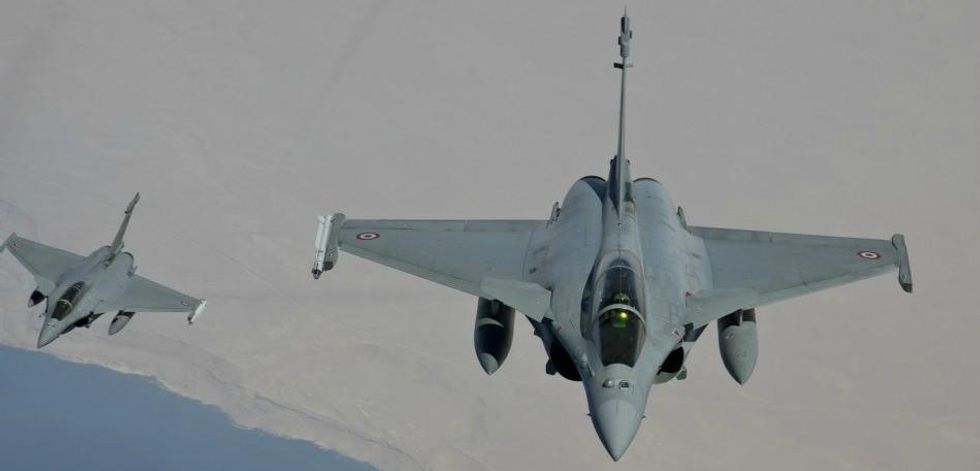According to an "exclusive"
report by
The Daily Beast on Wednesday, the
Obama administration has asked the Pentagon to give further review to a series of US military plans for
Syria, including the implementation of a "no fly zone" over the country.
A famous and innocuous-sounding euphemism in military circles, a "no fly zone" demands overt military action which would necessitate a massive bombing campaign focused on wiping out anti-aircraft capabilities, radar installations, and the opposition's own air forces. The fact that creating a "no fly zone" requires such an intense, offensive bombing campaign is often left out of mainstream media reporting in the US.
"The first act in imposing a no-fly zone is an extensive bombing campaign -- an act of war." -Phyllis Bennis, Institute for Policy Studies
The Daily Beast, an outlet well known for offering anonymity to government sources in exchange for exclusive access to high level officials, reports that one unnamed member of the administration said, "The White House is still in contemplation mode but the planning is moving forward and it's more advanced than it's ever been."
The source continued, "All this effort to pressure the regime is part of the overall effort to find a political solution, but what happens if Geneva fails? It's only prudent to plan for other options."
But what's "prudent" about a "no fly zone"?
According to Common Dreams contributor and foreign policy analyst Shamus Cook, nothing.
"One country cannot enforce a no fly zone inside another country without first destroying the enemy Air Force, not to mention its surface to air missiles," Cook wrote earlier this month.
"We saw in Libya that a no fly zone quickly evolved into a full scale invasion, which would happen again in Syria," he continued. The main difference, argues Cook, is "that Syria has a more powerful army with more sophisticated weaponry, not to mention powerful allies -- Iran and Russia."
And Russia proved that aspect of their involvement this week by promising it would send the Syrian government even more advanced missile systems if the EU or US begin sending weapons to the Syria opposition. Experts in the US quickly warned that the presence of Russia's S-300 missile system would make creating a so-called "air corridor" remarkably more difficult.
Yifat Susskind, executive director of the human rights group MADRE, also warns against a possible "no fly zone," saying history shows they often do more harm than good.
"The US bombing required to create and enforce a "no-fly zone" would almost certainly kill and injure more people." -Yifat Susskind, MADRE
"The US bombing required to create and enforce a "no-fly zone" would almost certainly kill and injure more people," Susskind wrote in a recent op-ed for Common Dreams.
"Moreover," Susskind continued,"roughly 10% of casualties in Syria have been caused by Assad's Air Force. The vast majority have been brutalized by ground forces, rendering a "no fly zone" a very weak form of protection."
And Phyllis Bennis, foreign policy expert and senior fellow at the Institute for Policy Studies, points out that a "no fly zone" is really just another name for invasion and ultimately an act of war.
As it was in Libya, creation of a "no-fly zone" is widely understood as a step towards regime change. According to Robert Gates, Secretary of Defense during the U.S. intervention in Libya, the first act in imposing a no-fly zone is an extensive bombing campaign -- an act of war. This time around, that would mean bombing Syria, to destroy its sophisticated anti-aircraft system. How many civilians would die in that bombardment, given the widespread presence of anti-aircraft facilities across the country, including in populated areas?
We should also note that Israel's ability to send bombers to attack several discrete sites in Syria, apparently from the skies above Lebanon, has little relation to the consequences of flying the dozens of U.S. sorties flown directly into Syrian airspace that would be needed to neutralize the entire strategic Syrian anti-aircraft system. Drones won't be enough for this one. So when the first U.S. bomber pilot is shot down, and special forces are sent in to rescue him, what happens to the "no boots on the ground" rule? Ignore it because the special forces guys wear sneakers instead of boots? Do we really want to claim that killing more Syrians with conventional bombs, to prevent the future possible use of alleged chemical weapons, is somehow a legitimate "humanitarian" effort?
____________________________________________________



